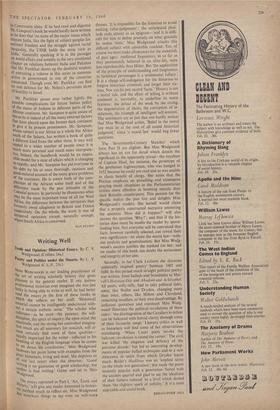Writing Well
Truth and Opinion: Historical Essays. By C. V. Wedgwood. (Collins, 16s.)
1‘,4_18S WEDGWOOD is our leading practitioner of the art of writing scholarly history that gives Pleasure to the general reader. If any jealous professional historian ever imagined she was just lucky in being able to write so well, he had better read the essays the first of these books in ,vv, hien she reflects on her craft. 'Historical "taterial cannot be intelligently understood with- out a certain aesthetic sense.' The scholar who cultivates—as he must—the patience, the self- °siseipline the spirit of inquiry, the open mind, the kiletitude and the strong but controlled itnagina- 1 tt.°n which are all necessary for research; will al- most certainly find some of these qualities- LquallY important for the writer—reflected in his landling of the English language when he comes halho set down his conclusions.' Miss Wedgwood set her point home,with examples from the !teal historians, living and dead, She deprives us ‘: our last retort when she observes: 'Good „ riting is no guarantee of good scholarship; but "either is bad writing.' Game and set to Miss Wedgwood.
The essays reprinted in Part I, 'Art, Truth and history will give any reader interested in histori- hal mehod mch toreflect on. Mss Wdgwood "as trenct hantu thingsr to say eveni on we ell-worn
themes. 'It is impossible for the historian to avoid making value-judgments' : the anticipated plati- tude ends almost as an epigram—`and it is diffi- cult for him to define precisely on what grounds he makes them.' Miss Wedgwood attacks this difficult subject with admirable candour. Yes, of course we must make allowances for the standards of past ages: mediaeval Inquisitors, in so far as they passionately believed in an after-life, were less reprehensible than Hitler. But 'the application of the principle of understanding and forgiveness to historical personages is a sentimental fallacy.' It is a cheap self-indulgence for the historian. to forgive historical criminals and forget their vic- tims. Nor can he just record 'facts. "History is not a moral tale, and the effect of telling it without comment is, inevitably, to underline its worst features: the defeat of the weak by the strong, the degeneration of ideals, the corruption of in- stitutions, the triumph of intelligent self-interest.' The sentiments are so just that one hardly notices that Miss Wedgwood writes, 'Belief in the moral law must lie at the root of all sound historical judgment,' when 'a moral law' would beg fewer questions.
The 'Seventeenth-Century Sketches' which form Part 11 are slighter. But Miss Wedgwood always has an eye for detail which detects the significant in the apparently trivial—the royalism of Captain Hind, for instance, the prototype of the gentleman highwayman, who was hanged in 1652 because he could not read and so was unable to claim benefit of clergy. She notes that the Puritan emphasis on preaching and extempore praying made chaplains in the Parliamentarian armies more effective in boosting morale than their Royalist counterparts. This passion for the specific makes the past live and delights Miss Wedgwood's readers. She herself would claim that a properly constructed narrative answering the question 'How did it happen?' will also answer the question 'Why?'; and that if the his- torian does more he insults the reader by spoon- feeding him. Not everyone will be convinced that facts, however carefully selected, can reveal their own significance—let alone the moral law—with- out analysis and generalisation. But Miss Wedg- wood's success justifies the method for her; and no reader of this book can doubt the seriousness and integrity of her aim.
Secondly, in her Clark Lectures she discusses 'politically inspired poetry' betWeen 1603 and 1088. In this period much straight political poetry was written, from ballads and broadsides to Mar- veil's Horatian ()de and Absalom and Achitophel.
All poets, willy-nilly, had to take political sides, some, like Waller and Dryden, changing more than once, others, like Milton and Cleveland, remaining steadfast, to their own disadvantage. By judicious quotation and comment Miss Wedg- wood illustrates the political revolutions of these years : 'the disintegration of the Cavaliers in defeat can be followed with horrid clarity through sonic of their favourite songs.' Literary critics as well as historians will find some of her observations stimulating. 'When Court poets invoke the halcyon, revolution is round the corner.' The civil war killed 'the elegance and delicacy of the previous decade,' but led to interesting develop- ments of popular ballad techniques and to a new directness in satire from which Dryden learnt much. Butler's Hudibras was an 'implied satire on the whole war generation'; this made the poem instantly popular with a generation 'bored with the•ancient quarrel and glad to see the idealisms of their fathers reduced' to a level which denied them 'the slightest spark of nobility.' It is a most enjoyable and useful book.
CHRISrOPHER 11111






































 Previous page
Previous page